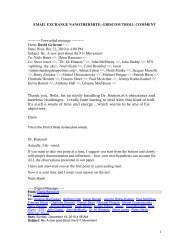court of appeal for ontario - academicfreedom.ca
court of appeal for ontario - academicfreedom.ca
court of appeal for ontario - academicfreedom.ca
Create successful ePaper yourself
Turn your PDF publications into a flip-book with our unique Google optimized e-Paper software.
[201] If I am wrong in my analysis <strong>of</strong> issue estoppel, I exercise that judicial discretion that the Supreme<br />
Court <strong>of</strong> Canada set out in Danyluk, supra, in the circumstances <strong>of</strong> this <strong>ca</strong>se.<br />
[202] It is the position <strong>of</strong> the corporate Defendants and the Trust that the issues were previously litigated and<br />
that the same facts have been raised be<strong>for</strong>e me. They say that these equitable doctrines are there to ensure<br />
that there is an end to litigation. The corporate Defendants and the Trust were never part <strong>of</strong> the earlier<br />
action. The action was that <strong>of</strong> Katana, and I have set out the issues, which MacKenzie J. said were be<strong>for</strong>e<br />
him involving Hilltop and DiBattista. None <strong>of</strong> those issues were be<strong>for</strong>e me. In the opening <strong>of</strong> these<br />
Reasons, I have listed the issues as set out in the various pleadings. None <strong>of</strong> those were be<strong>for</strong>e MacKenzie J.<br />
Katana, <strong>of</strong> course, is involved in both proceedings, given the nature <strong>of</strong> the proceedings. Kikas is a key<br />
player in both, and while there is an evidentiary overlap, the <strong>ca</strong>ses make it clear that this is not sufficient to<br />
bring res judi<strong>ca</strong>ta and issue estoppel into play. The Judgment <strong>of</strong> MacKenzie J. had nothing to do with the<br />
fraudulent conveyance issues. The Judgment <strong>of</strong> MacKenzie J. had nothing to do with the Trust and its<br />
interplay in the action be<strong>for</strong>e me. There was no finding in the earlier action, that Katana was Valleywood's<br />
agent or that he beneficially owns a substantial portion <strong>of</strong> it. The Wilson lands, in the action be<strong>for</strong>e me,<br />
<strong>ca</strong>me up in a totally different context, being that <strong>of</strong> their transfer by assignment from Hilltop to West<br />
Mayfield.<br />
[203] In my view, the Plaintiffs have not set up the same proceeding or the same issues in a different guise.<br />
The privies in the two <strong>ca</strong>ses are clearly different with the exception <strong>of</strong> DiBattista and Hilltop and Katana.<br />
Although the Defendants tried to argue that the Plaintiffs were really re-arguing the issue <strong>of</strong> breach <strong>of</strong><br />
contract again, I do not see this as the <strong>ca</strong>se be<strong>for</strong>e me. Nor were the issues raised in the various<br />
Counterclaims ones that were be<strong>for</strong>e MacKenzie J. I <strong>ca</strong>nnot see where Hilltop and DiBattista could have<br />
earlier raised the issues <strong>of</strong> fraudulent conveyance the Trust being a sham, in the earlier action. The Trust<br />
was unknown in the earlier action.<br />
[204] Abuse <strong>of</strong> process is a more general term than issue estoppel, and it is a discretionary principle that is<br />
not limited by any set number <strong>of</strong> <strong>ca</strong>tegories. Molloy J. in Kenderry-Esprit (Receiver <strong>of</strong>) v. Burgess,<br />
MacDonald, Martin & Younger, (2001) 53 O.R. (3d) 208 applies the principle set out by the Finlayson, J.A.,<br />
writing <strong>for</strong> the majority in Canam Enterprises Inc. v. Coles, (2000), 51 O.R. (3d) 481 [2000] O.J. No.46067<br />
(C.A.) at para. 31 [p.490 O.R.]:<br />
Abuse <strong>of</strong> process is a discretionary principle that is not limited by any set number <strong>of</strong> <strong>ca</strong>tegories.<br />
It is an intangible principle that is used to bar proceedings that are inconsistent with the<br />
objectives <strong>of</strong> public policy. The doctrine <strong>ca</strong>n be relied upon by persons who were not parties to<br />
the previous litigation but who claim that if they were going to be sued they should have been<br />
sued in the previous litigation.<br />
[205] The Court looks at whether the same evidence is needed to support the issues on both <strong>ca</strong>ses. It looks<br />
to see if a defendant had been named in the earlier proceeding, and had been able to defend the main action,<br />
that defendant would have been able to address the issues. It is the position <strong>of</strong> Valleywood, that its<br />
components Snelcrest, Mellow and #797, should not have been sued in the action be<strong>for</strong>e me. They say that<br />
if DiBattista and Hilltop wanted to go after Valleywood to collect on the Judgment <strong>of</strong> MacKenzie J.,<br />
Valleywood and its components should have been added as parties to DiBattista’s Counterclaim. While<br />
hindsight, after the Trial be<strong>for</strong>e MacKenzie, J. is helpful, it is not the <strong>ca</strong>se when one examines what the<br />
earlier action was all about and who the privies were. Katana, was the plaintiff in that action, not<br />
Valleywood. He distanced himself, in all documentation in that <strong>ca</strong>se, from Valleywood, to protect the<br />
Wilson lands and the agreement in his name. If he was to have a counterclaim against him, he wanted it to<br />
be personally against him. This happened in other times in the many lawsuits brought by Katana relating to<br />
the Valleywood lands. The other actions have been noted by me earlier in these Reasons.<br />
[206] In Toronto (City) v. C.U.P.E., Lo<strong>ca</strong>l 79, [2000] 187 D.L.R. (4 th ) 323 (Ont. Div. Ct.) the Court looked<br />
at what amounted to abuse <strong>of</strong> process. The Court quoted at pp.338 and 339 the Judgment <strong>of</strong> Lord Denning<br />
in Eagle, Star and British Dominion Insurance Co. v. Heller, 140 S.E. 314 (1927) at p.239, where he said that<br />
6<br />
2003 CanLII 45839 (ON SC)



